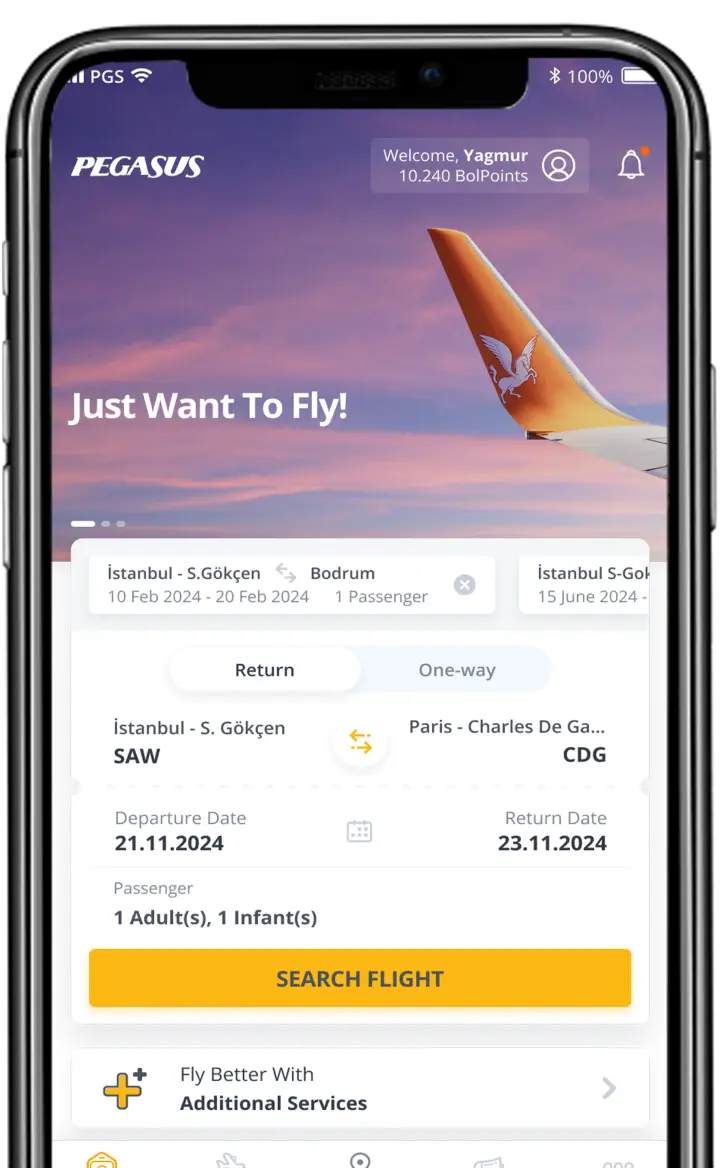
Portugal Visa Guide
With its golden beaches, majestic historical landmarks, rich cuisine, and unique culture, Portugal is the best destination for visitors seeking an unforgettable journey. Situated on the Iberian Peninsula, the country is home to a distinct architecture and an exquisite atmosphere.
Portugal Visa
If you plan to visit Portugal for any reason, you must have questions about the country's visa process. With this comprehensive guide we prepared, you can figure out which visa type is the best for you and carry out a seamless application process.
Do I Need a Visa to Travel to Portugal?
Portugal is a member of the European Union, the European Economic Area, and the Schengen Area. Therefore, the country's visa requirements depend on these unions' and areas' regulations.
EU and EEA citizens have the right to stay in Portugal for up to three months as long as they hold a valid passport. For stays longer than that, a residence permit is required.
Besides EU and EEA citizens, passport holders of the following countries can enter Portugal and stay in the country for 90 days without any visa type or residence permit.
Citizens of the following countries can visit Portugal without a visa:
- Albania
- Andorra
- Antigua and Barbuda
- Argentina
- Australia
- Bahamas
- Barbados
- Bosnia and Herzegovina
- Brazil
- Brunei
- Canada
- Chile
- Colombia
- Costa Rica
- Dominica
- El Salvador
- Georgia
- Grenada
- Guatemala
- Honduras
- Hong Kong
- Israel
- Japan
- Kiribati
- Kosovo
- Macau
- Malaysia
- Marshall Islands
- Mauritius
- Mexico
- Micronesia
- Moldova
- Monaco
- Montenegro
- New Zealand
- Nicaragua
- North Macedonia
- Palau
- Panama
- Paraguay
- Peru
- Saint Kitts and Nevis
- Saint Lucia
- Saint Vincent and the Grenadines
- Samoa
- San Marino
- Serbia
- Seychelles
- Singapore
- Solomon Islands
- South Korea
- Taiwan
- Timor-Leste
- Tonga
- Trinidad and Tobago
- Tuvalu
- Ukraine
- United Arab Emirates
- United States
- Uruguay
- Vanuatu
- Vatican City
- Venezuela
- United Kingdom
What Is the Schengen Area?
Before applying for a Portugal visa, one should understand what the Schengen area means, of which Portugal is a member state.
Simply put, the Schengen area is an area without internal border controls. So, within this area, residents can travel freely without encountering any border controls.
Dissolving the internal borders places responsibility on each member state. Countries within the Schengen area should carry out harmonized controls at their external borders and attentive visa processes to sustain the area's security.
Besides Portugal, there are 26 other countries in the Schengen area. Therefore, a Portuguese visa holder can travel through all these countries freely.
Portugal Visa Types
Portugal Work Visas
Portugal offers various types of work visa:
- Seasonal work visa: Seasonal workers can get this temporary visa type that allows them to stay in the country for up to 90 days.
- Independent work visa: A temporary visa type for independent workers.
- Highly qualified activity visa: Those who carry out scientific research, highly qualified activity, or work in higher education can apply for this temporary stay visa.
- Digital nomad visa: Those who exercise professional activity done remotely - also known as "digital nomads" - can apply for this visa type.
- Professorial activity visa: A temporary visa type for researchers and scholars carrying out a highly qualified activity.
- Amateur sports visa: Those involved in amateur sports can apply for this visa.
- Investigation visa: Another temporary visa for scientific research, higher education activities, or qualified activity purposes for less than a year.
Portugal Study Visa
Portugal offers a temporary visa type for those planning to stay in the country for study programs, student exchanges, unpaid internships, training, or volunteer work purposes. A study visa usually allows its holder to stay in the country for over a 3-month period.
Visa for Professional Training, Internship, or Volunteer Work
Usually, this visa type is for periods over three months. Workers and service providers coming to Portugal for professional training, exchange students, and those coming for training, unpaid internships, volunteer work purposes, and study programs can apply for this visa.
Visa for Medical Purposes
Those visiting Portugal for medical purposes and their accompanying family members can apply for this visa.
Youth Mobility Visa
Only the citizens of countries with whom Portugal signed a Memorandum of Understanding can get this visa. Youth Mobility Visa, also known as "Work and Holiday," allows its holder to remain in Portugal for over a 3-month period and work.
Currently, citizens of the following countries can get this visa:
- Argentina
- Australia
- Canada
- Chile
- Japan
- New Zealand
- Peru
- Republic of Korea
- United States of America
Passive Income Visa
Retired or those living on their own income can get a temporary visa for over three months in justified cases.
Visa for Religious Purposes
You can get this visa if you are going through training within a religious congregation or undertaking studies in a recognized institution for over three months.
Familiar Visa
If you hold a temporary stay visa, your accompanying family members can apply for a familiar visa.
Portugal Schengen Visas
Portugal has three different types of Schengen visas (also known as short-stay visas):
- Short-stay visa: Issued to allow for transit or short-term stay in the Schengen area, usually for up to 90 days.
- Seasonal work visa: Issued to allow for subordinate seasonal work for up to 90 days. Since this type of visa cannot be granted by Portugal by virtue of representing another Schengen member state, the worker should apply for a seasonal work visa through the consular post of the country where they wish to work.
- Airport transit visa: This visa is granted to allow a person to enter the international area of an airport.
Requirements and Necessary Documentation for Portugal Visa
Following is a list of general requirements to apply for a Portuguese visa.
- A valid passport or travel document
- Two passport-size pictures, taken per Portugal picture guidelines
- Proof of sufficient financial means to support your stay
- A Certificate of Criminal Records
- Proof of accommodation in Portugal, such as a rental contract, university dorm, or a letter of invitation from a family member/friend
- Proof of insurance coverage
- A visa application form
All of these documents must be either in English. Translations must be done by a certified translator and notarized. Besides, diplomas and civil documents must be legalized through an Apostille Stamp. Work visa:
- Permission to the SEF to check your criminal records in Portugal
- Proof of foreign worker health insurance coverage
- An employment contract
Those already in Portugal also must submit their proof of legal entry into Portuguese territory, such as a temporary visa. Plus, those applying from a place besides their country of origin must submit proof of legal stay, such as a residence permit. Student visa:
- Letter of Acceptance from a university
- Proof of paid tuition fees or a scholarship acceptance document
- Portugal student visa application form - often provided by the embassy
- A Certificate of Criminal Records
- Proof of Schengen travel health insurance
You can visit the official website of the Portuguese Ministry of Foreign Affairs to see up-to-date and specific requirements for each visa type.
If traveling to Portugal to visit family or friends:
- Letter of Invitation from family or friends
Youth mobility visa: The general conditions for applying for a youth mobility visa are:
- Being older than 18 but younger than 31 years of age
- Tertiary qualifications or completion of two years of undergraduate study
- Not being accompanied by dependent children or family members
For Australians:
- Proof of having a functional level of proficiency in Portuguese
- A letter from the relevant ministry
- A signed statement
For Canadians, one of the additional documentations:
- Work offer
- Registration in a high education or post-secondary institution
- Declaration of intention to travel and work incidentally
For South Koreans:
- Statement of intention to travel and work only to consolidate financial resources.
For Americans:
- A declaration stating that the visa application is under the Memorandum of Understanding.
Portugal Visa Fees
When applying for a Portuguese visa, you must pay a visa fee. However, the payment of the visa fee neither guarantees the granting of the visa nor entails a refund in case of refusal.
- General fee: 80 Euros
- Reduced fee: 40 Euros
Facilitation Agreements
The visa fee for the following countries is €35:
- Albania
- Armenia
- Azerbaijan
- Bosnia
- Bielorus (partial suspension)
- Georgia
- Macedonia
- Moldova
- Montenegro
- Russia (suspended)
- Serbia
- Ukraine
Citizens of Cabo Verde
- Adults: 60€
- Children (12-18 years): 30€
- Children (up to 12 years): Exempted
Citizens of Gambia (over 12 years old)*
- 120€
* Under an implementing decision by the Council to certain nationalities.
Fee Exemptions
The following persons can apply for a Portuguese visa without paying any fee:
- Children below the age of 6,
- Students, teachers, or professors traveling for training or study purposes,
- Researchers traveling for scientific research purposes,
- Representatives of non-profit organizations under 25 years of age attending seminars, conferences, cultural and sports events organized by non-profit organizations,
- Family members of EU Member States nationals, EEA countries, Swiss nationals, and UK nationals under the Withdrawal Agreement.
How to Apply for Portugal Visa
Follow these steps to apply for a Portuguese visa:
- Download and fill out the visa application form.
- Gather the required documents for your visa type.
- Submit the documents at the Portugal Embassy, Consulate, Visa Application Center, or through a visa service.
- Pay the visa fee.
- Wait for a response - This usually takes 15 calendar days yet might elongate due to various circumstances.
- Collect the visa - If your application is refused, start from scratch.
- Travel to Portugal and enjoy your stay!
FAQ
Frequently Asked Questions
How long does it take to get a Portuguese visa?


Although it depends on your application process, a Portuguese visa is usually processed within 15 calendar days.
When should I apply for a Portuguese visa?


The circumstances of your visa application may lengthen the process. Therefore, you should apply for a Portuguese visa at least one month prior to your travel to the country.
Can I get a multiple-entry tourist visa?


Temporary stay visas do allow multiple entries and are valid during the entire stay.
How can I check my Portugal visa status online?


If you applied for a Portuguese visa through a visa service, you may check your Portugal visa status online via the service's website.
May my Portugal visa application get rejected?


Various reasons might cause your Portugal visa application to get rejected without refunds. The most common reasons are:
- Invalid travel insurance,
- Insufficient reason for the stay,
- Inability to present evidence of accommodation,
- Fake travel documents,
- Inability to support your stay through financial means.


